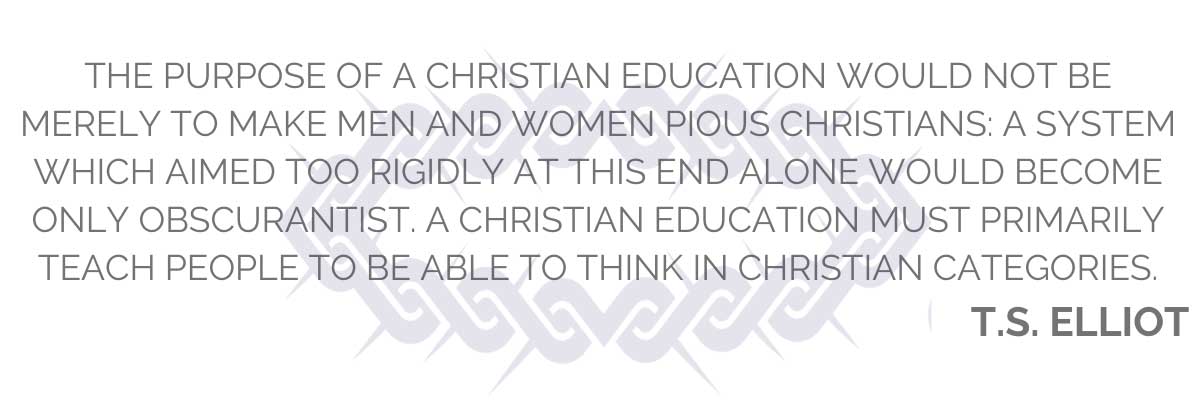
Dialectic (7th–9th grade)
The Augustine Dialectic School is where our students develop understanding and it corresponds to the second stage of the "Trivium." Students proceed from grammar to dialectic in the 7th grade (around the time of the middle school years) to take the facts and knowledge they have accumulated in K–6th and study their relationships during what is known as the dialectic stage. Students analyze how the many pieces of what they’ve learned affect one another and learn to reason using the laws of logic and argumentation.
As dialectic students learn formal logic, all their studies are taught through this rubric. Students of this age are prone to debate; we hand them the proper tools so that they may parley well–with reason and respect. While the short-term ramifications of this are not always pleasant (as they are eager to engage in debate with anyone . . . even parents!), the long-term benefits of developing a discerning mind are invaluable. The focus on logical thought development continues across the curriculum, especially as their writing focuses on persuasive essays. In all classes, from Algebra to Christocentricity of the Old Testament and from Latin to Analytic Science, students are challenged to not only learn the grammar of the subject (knowledge) but also to make connections between their learning and their faith, demonstrating understanding.
Rhetoric (10th–12th grade)
The Augustine Rhetoric School is where our students become young and winsome scholars and it corresponds to the third stage of the "Trivium." These later high school years are a time of learning to communicate and present knowledge in a winsome and engaging manner. In this third stage of the Trivium, students focus on learning to express themselves with eloquence. The material which they have accumulated in the grammar stage, and learned to analyze and understand in the dialectic stage, is now polished and presented in the rhetoric stage.
While our Upper School has the appearance of propriety—school uniforms, disciplined classrooms, respectful interactions between students and teachers–it is actually a wrestling match. Not down-in-the-dirt, bloody-knuckles, tempers-flaring wrestling, but a messy tangle nonetheless. Students grounded in knowledge from their grammar and dialectic school years are ready to take on the great ideas of the centuries, and they do so in many forms: speeches, debates, presentations, papers, and graded Socratic discussions. In their speaking and writing, they carefully consider the complexity of ideas, weigh the arguments, argue both sides, and develop conclusions. Rhetoric level thinking occurs in the context of a biblical worldview; students are taught to turn to Scripture as they form their opinions. As rhetoric students mature into young adults in the culminating years of high school, we begin to see thoughtful individuals who are prepared to see the world as God sees it, through a Christian worldview; and, with a strong knowledge base and a solid understanding of core disciplines, rhetoric students articulate a biblical worldview.
Rhetoric studies focus on the great ideas and great books of the western tradition through a bespoke Augustine Humanities curriculum, Great Ideas I & II and Great Works of Theology, and culminates in a capstone course, Classical Rhetoric, which focuses on a close read of Aristotle's "On Rhetoric" followed by a 30-page thesis paper written on a topic of choice under the close supervision of their teacher and 20 minute "viva voce" before a panel of experts from the wider community. Having engaged in debate throughout their studies, Augustine rhetoric students have learned Christian charity in discussing ideas with opponents and are truly growing in wisdom, prepared for college and life beyond Augustine.

